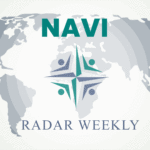Subscribe to NAVI Radar Weekly
Focus Point: Regional Security- European Security
Secretary General urges continued close NATO-EU cooperation to support Ukraine and face growing threats |NATO
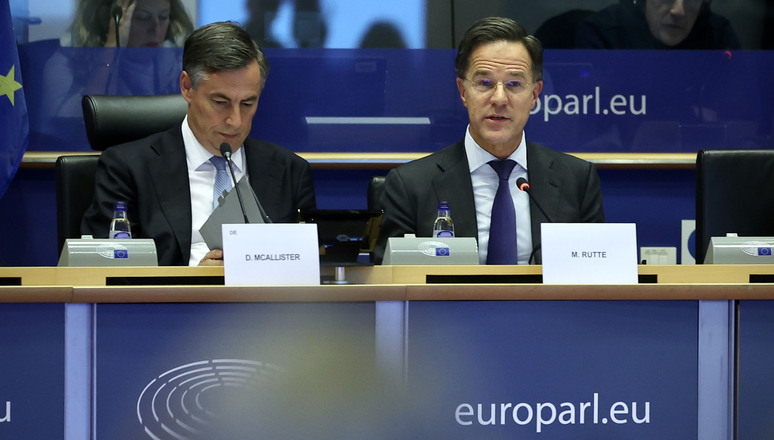
By NATO | 13.01.2025
On Monday (13 January), NATO Secretary General Mark Rutte addressed the European Parliament’s Committee on Foreign Affairs and Subcommittee on Security and Defence. He gave an overview of NATO priorities, including defence spending and production, and support to Ukraine and answered questions from Members of the European Parliament. Read more…
Focus Point: Social, Economic & Security
When Do Parties Lie? Misinformation and Radical-Right Populism Across 26 Countries | SAGE Journals
By Petter Törnberg and Juliana Chueri | 13.01.2025
The spread of misinformation has emerged as a global concern. Academic attention has recently shifted to emphasize the role of political elites as drivers of misinformation. Yet, little is known of the relationship between party politics and the spread of misinformation—in part due to a dearth of cross-national empirical data needed for comparative study. This article examines which parties are more likely to spread misinformation, by drawing on a comprehensive database of 32M tweets from parliamentarians in 26 countries, spanning 6 years and several election periods. The dataset is combined with external databases such as Parlgov and V-Dem, linking the spread of misinformation to detailed information about political parties and cabinets, thus enabling a comparative politics approach to misinformation. Using multilevel analysis with random country intercepts, we find that radical-right populism is the strongest determinant for the propensity to spread misinformation. Populism, left-wing populism, and right-wing politics are not linked to the spread of misinformation. These results suggest that political misinformation should be understood as part and parcel of the current wave of radical right populism, and its opposition to liberal democratic institution. Read more…
Focus Point: Regional Security- Transatlantic Security/NATO
NATO launches ‘Baltic Sentry’ to increase critical infrastructure security | NATO
By NATO |14.01.2025
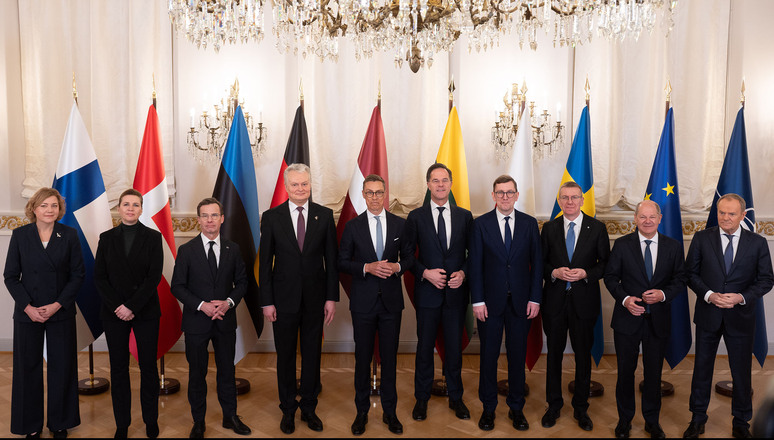
NATO Secretary General, Mark Rutte co-hosted a Summit of Baltic Sea Allies on Tuesday (14 January 2025), along with President Alexander Stubb of Finland and Prime Minister Kristen Michal of Estonia.
At the meeting in Helsinki, Mr Rutte announced the launch of a new military activity by NATO to strengthen the protection of critical infrastructure. “Baltic Sentry” will enhance NATO’s military presence in the Baltic Sea and improve Allies’ ability to respond to destabilizing acts.
At the Summit, leaders from across the region addressed the growing threat to critical undersea infrastructure. The Secretary General said recent sabotage had damaged energy and communication cables, but he was confident that, “by working together with all Allies – we will do what it takes to ensure the safety and security not only of our critical infrastructure but of all that we hold dear.”
“Baltic Sentry” will involve a range of assets, including frigates and maritime patrol aircraft. The Secretary General also announced the deployment of new technologies, including a small fleet of naval drones, and highlighted that NATO will work with Allies to integrate national surveillance assets – all to improve the ability to protect critical undersea infrastructure and respond if required. NATO will work within the Critical Undersea Infrastructure Network, which includes industry, to explore further ways to protect infrastructure and improve resilience of underwater assets. Read more…
Focus Point: Regional Security- Middle East
What we know about emerging Gaza ceasefire and hostage release deal | CNN
By Jeremy Diamond, Mick Krever and Lauren Kent | 14.01.2025 Updated 20.01.2025
Major progress has been made between Israel and Hamas on a ceasefire and hostage deal in Gaza, which the Israeli government expects will be announced later Wednesday or Thursday, two sources familiar with the matter told CNN.
“We are very close,” one of the sources said Wednesday. If a deal is finalized, implementation would most likely start on Sunday. The agreement is set to be implemented in three phases, the first of which would last 42 days.
The deal would deliver the first reprieve from war for the people of Gaza in more than a year, and only the second since Hamas’ October 7, 2023, attack.
The first phase would see the release of 33 hostages held by Hamas and its allies since October 7, including women, children, men over the age of 50 and wounded people.
Israel would release “many hundreds” of Palestinian prisoners in exchange, an Israeli official said, including Palestinians convicted of killing Israelis.
Negotiations to reach the second and third phases of a ceasefire agreement – which is intended to end the war – would begin on the 16th day of the implementation of the deal, according to the Israeli official.
The ceasefire is not guaranteed to continue beyond the first phase of the deal. However, the official said Israel is eager to “bring all our hostages back home” and will enter negotiations to enter the second phase of the agreement in good faith, which could lead to the full withdrawal of Israeli forces from Gaza. Read more…
Focus Point: Regional Security- Transatlantic Security/NATO
Russia open for talks with Trump after Putin’s diplomat praises his attack on Nato | Independent
By AP Correspondent | 15.01.2025
Trump has echoed Moscow’s rhetoric, which has described its ‘special military operation’ in Ukraine as a response to planned NATO membership for Kyiv.
Russia’s top diplomat said that Moscow is open for talks with President-elect Donald Trump and praised him for attacking Nato’s plan to embrace Ukraine.
Any prospective peace talks should involve broader arrangements for security in Europe, Russian Foreign Minister Sergey Lavrov said at his annual news conference Tuesday.
Lavrov specifically praised Trump’s comments earlier this month in which he said that Nato’s plans to open its doors to Ukraine had led to Russia’s invasion of Ukraine.
Trump said Russia had it “written in stone” that Ukraine’s membership in Nato should never be allowed, but the Biden administration had sought to expand the military alliance to Russia’s doorstep. Trump noted: “I could understand their feelings about that.” Read more…
Focus Point: Security and Defense Policy- Russia-Ukraine War
Ukraine strikes Russia with missiles and drones in one of largest air attacks| Reuters
By Reuters | 15.01.2025
Summary
👉 Ukraine fires ATACMS and Storm Shadow at Russia
👉 Russia shoot down U.S. and British missiles
👉 Ukraine struck Russia with 146 drones, Russia says
👉 Russia vows a response to the attacks
👉 Ukraine says it struck deep into Russia.
On January 14, Russia’s military on Tuesday said it would retaliate against Ukraine after Kyiv attacked Russian regions by firing six U.S.-made ATACMS ballistic missiles, six UK-made Storm Shadow cruise missiles and launching one of the biggest drone attacks to date.
After Ukraine first launched ATACMS and British Storm Shadow missiles into Russia last year, Moscow responded on Nov. 21 by launching a new intermediate-range hypersonic ballistic missile known as “Oreshnik”, or Hazel Tree, at Ukraine. Read more…
Focus Point: Regional Security- Transatlantic Security/NATO
Allied Chiefs of Defence meet with NATO Secretary General Mark Rutten| NATO
By NATO | 15.01.2025
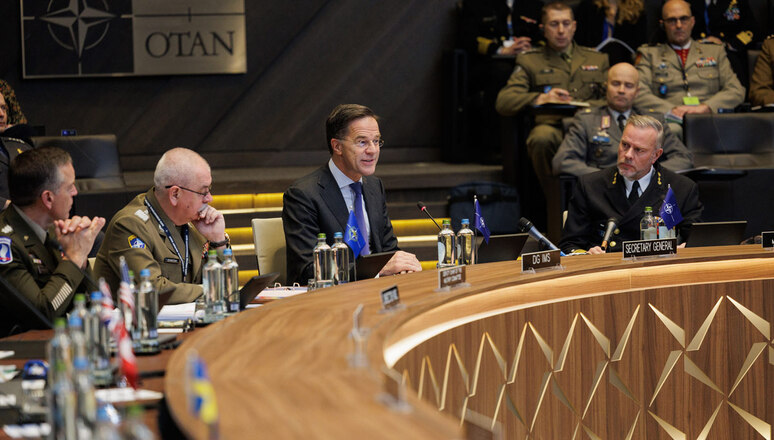
Today and tomorrow, 15 – 16 January 2025, NATO’s highest Military Authority, the Military Committee, meets in Chiefs of Defence format at NATO Headquarters in Brussels. The meeting focuses on further strengthening deterrence and defence of the Alliance, strengthening NATO’s Partnerships around the world as well as supporting Ukraine in its resistance against Russia’s unprovoked aggression. Across both days, Allied Chiefs of Defence will meet with Military Authorities from NATO Partner countries to discuss how to best tackle pervasive instability around the globe together.
In his opening remarks, NATO Secretary General Mark Rutte conveyed, “to prevent war, we need to prepare for it. It is time to shift to a wartime mindset.” Furthermore, he stressed that this entails increasing defence spending, continuing to support Ukraine, and strengthening cooperation with NATO Partners across the globe. Read more…
Focus Point: Emerging Technologies & Data- Cyber Security
Spy vs. AI | FA
By Anne Neuberger | 15.01.2025 I Subscription needed
AI’s potential to revolutionize the intelligence community lies in its ability to process and analyze vast amounts of data at unprecedented speeds. It can be challenging to analyze large amounts of collected data to generate time-sensitive warnings. U.S. intelligence services could leverage AI systems’ pattern recognition capabilities to identify and alert human analysts to potential threats, such as missile launches or military movements, or important international developments that analysts know senior U.S. decisionmakers are interested in. This capability would ensure that critical warnings are timely, actionable, and relevant, allowing for more effective responses to both rapidly emerging threats and emerging policy opportunities. Multimodal models, which integrate text, images, and audio, enhance this analysis. For instance, using AI to cross-reference satellite imagery with signals intelligence could provide a comprehensive view of military movements, enabling faster and more accurate threat assessments and potentially new means of delivering information to policymakers. Read more…
Focus Point: Regional Security- Transatlantic Security/NATO
Allied and Partner Chiefs of Defence meet to discuss deterrence and defence | NATO
By NATO | 17.01.2025
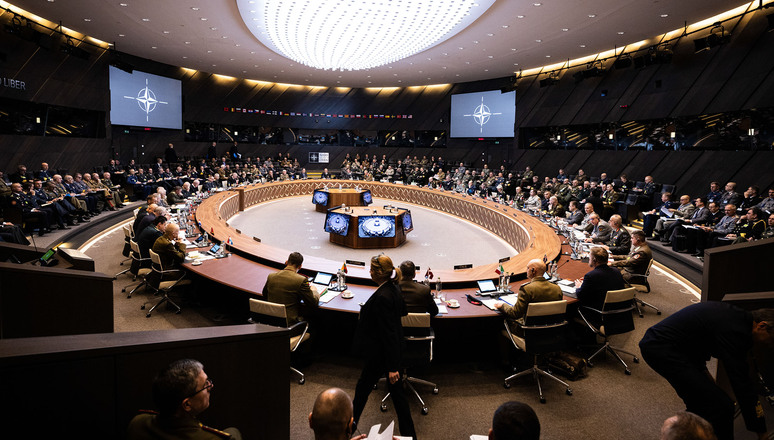
Opening the NATO Military Committee session alongside NATO Secretary General Mark Rutte, the Chair of the Military Committee Admiral Rob Bauer stressed that the priorities of the NATO Military Authorities are to, ‘strengthen the deterrence and defence of the Alliance and at the same time support Ukraine in its resistance against Russia’s unprovoked aggression’. The Chair emphasised that Allies must be better prepared for the future by ensuring that the conditions are in place to have the readiness required to implement NATO’s new defence plans.
The first session saw General Cavoli, Supreme Allied Commander Europe – SACEUR, brief on NATO’s readiness and the status of NATO’s operations, missions, and support to Ukraine through the NATO Security Assistance and Training for Ukraine (NSATU).
This was followed by the Chiefs of Defence meeting with Admiral Pierre Vandier, Supreme Allied Commander Transformation- SACT. Admiral Vandier briefed the Chiefs of Defence on NATO’S Warfighting Transformation, the Defence Planning Process and the status of the NATO-Ukraine Joint Analysis, Training, and Education Centre (JATEC).
Over the course of the Meeting, the Chiefs of Defence met with 27 NATO Partners to discuss military cooperation, interoperability and information sharing. Represented were: Algeria, Armenia, Australia, Austria, Azerbaijan, Bosnia and Herzegovina, Colombia, Egypt, Georgia, Iraq, Ireland, Israel, Japan, Jordan, Kazakhstan, Malta, Moldova, Mongolia, Morocco, New Zealand, Qatar, Republic of Korea, Serbia, Switzerland, Tunisia, Ukraine and the European Union.
The discussion focused on how NATO can support Partners in an era of pervasive global instability, cross-regional security challenges and opportunities for cooperation. Special sessions were held with NATO’s Operational Partners (Armenia, Austria, Bosnia and Herzegovina, Georgia, Ireland, Ukraine, Moldova, Switzerland, Jordan, Australia, New Zealand) and Partners in the Indo-Pacific (Australia, New Zealand, Japan and the Republic of Korea).
The final session saw NATO Chiefs of Defence virtually meeting with the Chief of Defence of Ukraine, Oleksandr Syrskyi. Allies reinforced their strong and continued support to Ukraine. Admiral Bauer emphasised that, ‘it is in the political and military interest of the Alliance to support Ukraine not only now, but also in the future.’ Read more…
Focus Point: Regional Security- Transatlantic Security/NATO
First NATO Country Announces It Will Match Trump’s 5% Defense Ultimatum| Newsweek
By Shamim Chowdhury | 17.01.2025
In a move to strengthen its national defense, Lithuania has announced plans to increase its defense spending to between 5 percent and 6 percent of its gross domestic product (GDP), starting in 2026.
Currently, Lithuania spends just over 3 percent of its GDP on defense, a figure that places it well below the new target.
Why It Matters
The decision, confirmed by Lithuanian President Gitanas Nausėda on Friday, reflects growing concerns about Russian military aggression in the region, particularly as tensions with Moscow remain high amid the war in Ukraine. The Baltic country shares a border with Russia’s Kaliningrad Oblast.
With the pledge to reach 5 percent, Lithuania will become the first NATO member to meet a defense spending goal recently suggested by President-elect Donald Trump. Read more…
Focus Point: Regional Security- Middle East
Last-Minute Gaza Negotiations Indicate Tough Road Ahead | WSJ
By Jared Malsin and Anat Peled | 17.01.2025 | Subscription needed
To understand the fragility of the Gaza cease-fire deal, look at the past two days of intense negotiations to resolve last-minute issues.
Israeli Prime Minister Benjamin Netanyahu finally said early Friday that a deal was done—nearly two days after U.S. leaders and Arab negotiators had celebrated it.
Netanyahu delayed his announcement as Israel and Hamas continued to haggle over some of the points of disagreement that have bedeviled talks for months, underscoring the challenges that lie ahead. The Israeli prime minister also had to wrangle his own coalition partners who have resisted the deal.
The two sides have yet to agree on a host of issues, including the lists of all the hostages and prisoners to be released, the timeline and extent of Israel’s military withdrawal from Gaza, and how the strip will be governed in the aftermath of the war. Hamas has also demanded a guaranteed end to the war, something Israeli officials have never agreed to and that key members of the Israeli government oppose.
The agreement calls for an initial pause in the fighting starting on Sunday. Hamas would release some of the Israeli hostages held for over a year in Gaza in return for hundreds of Palestinian prisoners in Israeli jails.
The days and weeks ahead could prove to be the most difficult. The cease-fire agreement calls on Israel and Hamas to negotiate important aspects of the second phase of the deal, which is designed to result in an end to the war, during the initial phase. One or both sides could find reason to eject from the deal after the initial phase, resulting in a resumption of fighting. Read more…
Focus Point: Regional Security- Transatlantic Security/NATO
Russia is escalating its dangerous shadow war against NATO, and there are fears it could get a lot worse | Business Insider
By Jake Epstein | 17.01.2025
👉 Russia is believed to be behind dozens of hybrid attacks on NATO going back years.
👉 These incidents — part of a so-called shadow war — have escalated since the invasion of Ukraine.
👉 NATO is now surging its efforts to respond to the attacks and monitor threats to infrastructure. Read more…
Focus Point: Regional Security- Transatlantic Security/NATO
Slovakia debates EU and NATO exit after key ally’s remarks | essanews
By BAR | 18.01.2025
Tibor Gašpar, a close associate of Prime Minister Robert Fico, suggested that Slovakia might leave the EU and NATO. His words prompted an immediate reaction from Slovak President Peter Pellegrini.
Tibor Gašpar, vice-chairman of the Slovak parliament and a member of the official parliamentary delegation that spent three days in Moscow earlier this week, appeared on Slovak state television STVR on Friday. His words sparked significant controversy in Slovakia.
Gašpar, who is also a member of the strongest party in the ruling coalition, Direction - Slovak Social Democracy (Smer-SSD), stated during the interview that although leaving the EU and NATO “is not a priority goal” for his group at the moment, “options must be left open for a situation where we might consider such an extreme solution.” Read more…
Thank you very much for reading.
The NAVI Research Institute is the research division of NATO Veterans Initiative - NAVI that provides a unique perspective to transatlantic leaders and societies on peace and security through the lens of NATO's founding principles of rule of law, democracy, human rights, and individual liberties. The NAVI Research Institute was officially established by the NAVI Board on July 16th, 2023.
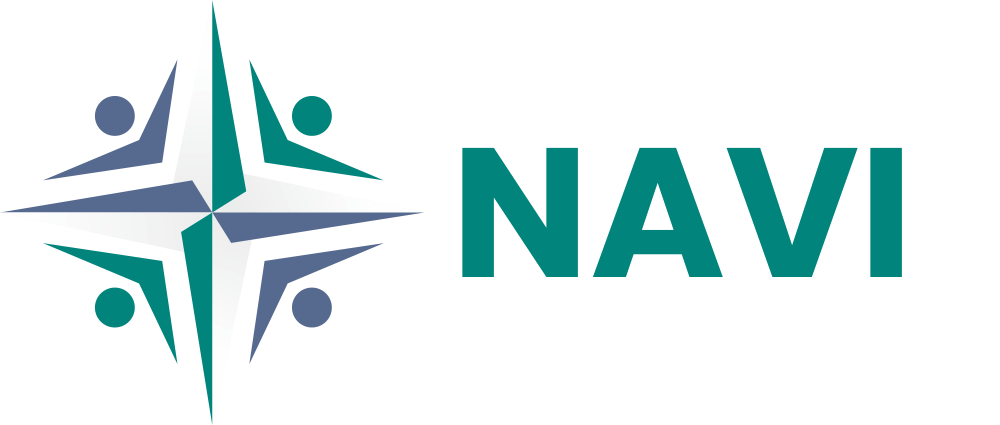
![NAVI-PROJE-[Recovered] Radar Weekly](https://nato-veterans.org/wp-content/uploads/2024/05/NAVI-PROJE-Recovered-696x392.gif)
